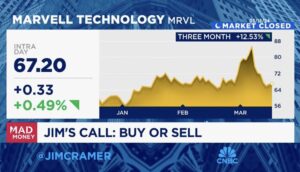
When you make purchases through our links we may earn a small commission.

Photo Credit: Kanashi
This article was republished with the implied consent from FactCheck.org, authored by Kate Yandell on
Quick Take
Full Story
COVID-19 has killed more than 1.1 million people in the U.S. People with cancer who get COVID-19 have an elevated risk of severe disease and death, especially those who have certain blood cancers. Vaccines help mitigate these risks.
The COVID-19 vaccines can cause largely minor and short-lived side effects, such as fatigue and soreness at the injection site, which have been generally consistent in people with and without cancer. There isn’t evidence to date that COVID-19 vaccines cause cancer or lead to worsening cancer for people who already have it.
However, unsupported claims that the COVID-19 vaccines cause cancer have repeatedly surfaced on social media. “SHOCKING: New Study proves Pfizer mRNA induced turbo cancer,” recent posts have said. They claimed that a single mouse in this study “died suddenly,” a phrase associated with a family of groundless claims that the COVID-19 vaccines are killing large numbers of people.
Sander Eens, a cardiovascular disease researcher at the University of Antwerp who co-authored the study in question, criticized how the social media posts characterized his work.
“Specifically, our case report has been misinterpreted as evidence that Pfizer/BioNTech’s COVID-19 mRNA vaccine could cause a scientifically unrecognized phenomenon called ‘turbo-cancer,’” he told us in an email.
“Turbo cancer” is a term used by people who claim that the COVID-19 vaccines are dangerous and can cause particularly fast-growing cancer, but there isn’t evidence that this phenomenon is real.
The recent study, published May 1 in Frontiers in Oncology, describes one mouse that died from lymphoma out of 14 mice that were given a high dose of the Pfizer/BioNTech vaccine delivered into their veins, which is not how the COVID-19 vaccines are given to people. The study does not show the mouse’s blood cancer was related to the vaccine.
“Our case report in no way attempts to demonstrate a causal relationship between the identified lymphoma and the mRNA vaccine,” Eens said. He added that he and his colleagues have now dosed 70 mice with the vaccine and have seen no further cases of any type of cancer.
Dr. Jason D. Goldman, an infectious disease physician, clinical researcher and epidemiologist at Swedish Medical Center and the University of Washington, emphasized the difficulty of determining whether one event causes another.
“You really can’t tell from a one-off if something has a causal relationship, meaning, does the vaccine cause the cancer? … Cancer happens, and when you vaccinate billions of people, of course many events are going to happen after the vaccines because that’s what happens and it would have happened anyway,” he said. “When we start seeing more patterns is when we think about causality.”
So far, researchers have not seen a larger pattern. “Lastly, we would like to stress that COVID-19 vaccines have demonstrated exceptional safety and efficacy in the fight against the pandemic, and manifestations of serious adverse events after COVID-19 vaccination are very rare,” Eens told us. “To date, there is no scientific evidence of a causal link between mRNA vaccines and cancer development.”
Mouse Study Does Not ‘Prove’ Vaccine Caused Cancer
COVID-19 vaccines are injected into the muscle. Eens and his colleagues gave mice either a high dose of the Pfizer/BioNTech vaccine or a placebo delivered directly into their bloodstream.
The study was not meant to evaluate cancer in mice. Rather, the researchers were attempting to induce myocarditis, they explained in their paper, with the intent to use the mice to study this problem. Myocarditis, or inflammation of the heart muscle, is a rare serious side effect of the mRNA COVID-19 vaccines.
The mice generally did not experience adverse events, with the exception of the one mouse that died of B-cell lymphoblastic lymphoma two days after its second vaccine dose. Lymphomas are cancers of immune cells originating in the lymphatic system. There are many different types of lymphoma and they come with a variety of possible treatments and prognoses in humans.
Sanjay Mishra, coordinator of the COVID-19 and Cancer Consortium registry and a researcher at Brown University, told us in an email that the particular type of mice used in the study “are predisposed to developing sarcomas and lymphomas, which is why they are used so frequently in neoplastic [cancer-related] studies.” He also said the “unusually high concentration” of vaccine delivered to the mice and the intravenous delivery were limitations of the work.
Eens called his paper a “case report” and explained that these studies “are certainly not used to demonstrate causality (i.e., in this case between COVID-19 vaccination and the lymphoma).”
Writing on his blog Respectful Insolence, surgical oncologist and researcher Dr. David Gorski said that it was highly unusual to even write a case report about a mouse — case reports are usually done to describe clinical cases in humans.
Gorski also estimated that relative to their body weight, the mice got a vaccine dose that was hundreds of times greater than the dose adult humans get. And he said that the mouse likely already had cancer before ever being vaccinated, pointing out that it had already lost a large amount of weight before getting the first dose — a sign of preexisting disease.
No Established Link Between COVID-19 Vaccines and Cancer
The COVID-19 vaccines were tested in large clinical trials, which helped establish their more common side effects and did not show a link between the vaccines and cancer.
Safety monitoring systems look out for further side effects once vaccines are broadly available. And although the initial COVID-19 vaccine trials did not include many people with cancer, researchers have subsequently studied safety in this group of people.
“Whether original trials studied enough cases with lymphoma or not, there is no evidence since their roll-out that COVID-19 vaccines cause cancer, lead to recurrence, or lead to disease progression,” Mishra said.
Pfizer, the Centers for Disease Control and Prevention, and the Food and Drug Administration told Lead Stories in response to questions about Eens’s study that their monitoring had not uncovered a causal link or safety signal related to cancer and COVID-19 vaccines.
Scientists have raised theoretical concerns about a relationship between vaccination and lymphoma before, based on an association of some lymphomas with inflammation and autoimmune conditions. Vaccines “may overstimulate the immune system as well as trigger autoimmune responses,” Mishra said.
Dr. Jeremy Warner, a physician focused on blood cancer and cancer informatics at Brown University, told us that “lymphomas are a very unusual family of cancers and I don’t want to pretend that we know everything about their etiology.” He said that inflammation-related lymphomas are often indolent, meaning they are slow-growing.
Studies have mainly either found no association between vaccination and risk of lymphoma or have found a decreased risk.
A 2022 study of 2,461 people with lymphoma and 2,253 people without lymphoma compared their history of vaccination for hepatitis A, hepatitis B, yellow fever and flu. The study, published in Cancer Epidemiology, Biomarkers & Prevention, did not find an increased risk of lymphoma in people who had been vaccinated and found that vaccination was in some cases associated with a lower risk of lymphoma.
“COVID-19 vaccines should be no different than other vaccines, despite being of a different class,” Mishra said.
Human Case Reports Do Not Show What Caused Lymphomas
Eens and his colleagues cited past case reports of lymphoma diagnosis, progression, regression or recurrence in humans after vaccination. These case reports describe a variety of types of lymphoma.
As we have discussed, case reports can help guide hypotheses, but they are not meant to be definitive or show causal relationships.
“Any observations in humans are most likely confusing correlation for causation,” Warner said. He added that “most people are getting vaccinated now, which means most new lymphoma diagnoses will occur in temporal relation to vaccination, whether or not they have anything to do with vaccination.”
Some of the case reports describe lymphomas that developed on one side near the site of vaccination, but this is also not necessarily evidence that the vaccines caused the lymphomas. A study published earlier this year in Cancer Medicine illustrates this point.
A group of German researchers decided to look into lymphoma and COVID-19 vaccination at two medical centers after they diagnosed lymphoma in the armpits of two patients. These lymphomas were found on the same sides where the patients had been vaccinated, in lymph nodes that could have received drainage from the deltoid region where the COVID-19 vaccines are generally given.
But after analyzing 313 cases of non-Hodgkin lymphoma, the researchers found that lymphomas manifested on one side of the body in deltoid drainage lymph nodes at similar rates both before and after the COVID-19 vaccines became available. For patients diagnosed with lymphoma after vaccination, there was no association between the sides where the lymphomas appeared and where they got the shot.
COVID-19 Vaccines Benefit Cancer Patients
The CDC and various cancer-related organizations recommend that cancer patients get vaccinated against COVID-19. Some people with cancer, particularly those with certain blood cancers or receiving certain treatments, may have a weaker immune response to the vaccines. Even so, most patients have at least some benefit from vaccination.
“Patients with hematologic malignancies are at greater risk of illness and mortality from COVID-19, so despite the limited immunological response of the vaccines, they are highly advised to get the vaccines and boosters,” Mishra said.
“When we give vaccines to patients with lymphoma, we don’t see any turbocharging of the cancer clinically, and we do see protection sometimes from getting COVID at all, but more commonly from getting a serious form of COVID that could result in getting on a ventilator or death,” said Goldman, who specializes in treating immunocompromised patients in his work as an infectious disease doctor at Swedish Medical Center.
The CDC recommends that people who are moderately or severely immunocompromised get extra vaccine doses. This group includes people who have blood cancers associated with reduced vaccine response, as well as people with cancer who are currently in treatment.
Editor’s note: FactCheck.org is one of several organizations working with Facebook to debunk misinformation shared on social media. Our previous stories can be found here. Facebook has no control over our editorial content.
Sources
“COVID Data Tracker: Trends.” CDC website. Accessed 31 Aug 2023.
Venkatesulu, Bhanu Prasad, et al. “A Systematic Review and Meta-Analysis of Cancer Patients Affected by a Novel Coronavirus.” JNCI Cancer Spectrum. 24 Feb 2021.
Han, Shuting et al. “Impact of Cancer Diagnoses on the Outcomes of Patients with COVID-19: A Systematic Review and Meta-Analysis.” BMJ Open. 7 Feb 2022.
Starkey, Thomas et al. “A Population-Scale Temporal Case–Control Evaluation of COVID-19 Disease Phenotype and Related Outcome Rates in Patients with Cancer in England (UKCCP).” Scientific Reports. 25 Jul 2023.
Khoury, Emma et al. “Differences in Outcomes and Factors Associated With Mortality Among Patients With SARS-CoV-2 Infection and Cancer Compared With Those Without Cancer: A Systematic Review and Meta-Analysis.” JAMA Network Open. 9 May 2022.
“COVID-19 Resources and FAQs.” Leukemia & Lymphoma Society website. Updated 11 Aug 2023.
Henley, S. Jane et al. “COVID-19 and Other Underlying Causes of Cancer Deaths — United States, January 2018–July 2022.” Morbidity and Mortality Weekly Report. 16 Dec 2022.
“Overview COVID-19 Vaccination.” CDC website. Updated 23 May 2023.
Hicks, Lisa K. and Vijenthira, Abi. “COVID-19 and Blood Cancer in the Vaccination Era.” Blood. 29 Dec 2022.
Best, Ana F. et al. “COVID-19 Severity by Vaccination Status in the NCI COVID-19 and Cancer Patients Study (NCCAPS).” Journal of the National Cancer Institute. 25 Jan 2023.
Tan, Wei Chong et al. “COVID-19 Severity and Waning Immunity After up to 4 mRNA Vaccine Doses in 73 608 Patients With Cancer and 621 475 Matched Controls in Singapore: A Nationwide Cohort Study.” JAMA Oncology. 13 Jul 2023.
“How Safe Are the Vaccines?” FactCheck.org. Updated 17 May 2023.
Fendler, Annika et al. “COVID-19 Vaccines in Patients with Cancer: Immunogenicity, Efficacy and Safety.” Nature Reviews Clinical Oncology. 11 Mar 2022.
“COVID-19 Vaccines in People with Cancer.” American Cancer Society website. Updated 12 May 2023.
“COVID-19 Vaccines and People with Cancer.” National Cancer Institute website. Updated 1 Aug 2023.
Spencer, Saranac Hale. “Idaho Doctor Makes Baseless Claims About Safety of COVID-19 Vaccines.” FactCheck.org. Updated 10 Feb 2022.
Spencer, Saranac Hale. “Three Canadian Doctors Died of Long-Term Illnesses, Contrary to False Claims COVID-19 Vaccine Was Cause.” FactCheck.org. Updated 5 Aug 2022.
Dr Liz O’Riordan (@Liz_ORiordan). “This is complete and utter NONSENSE!!!!” X. 3 Aug 2023.
Leading Report (@LeadingReport). “BREAKING: New study proves Pfizer mRNA vaccine induced turbo cancer.” X. 18 Aug 2023.
DiedSuddenly (@DiedSuddenly_). “SHOCKING: New Study proves Pfizer mRNA induced turbo cancer.” X. 18 Aug 2023.
Welbern Media (@welbernmedia). “SHOCKING: New Study proves Pfizer mRNA induced turbo cancer.” Instagram. 20 Aug 2023.
Spencer, Saranac Hale et al. “‘Died Suddenly’ Pushes Bogus Depopulation Theory.” FactCheck.org. 1 Dec 2022.
Jaramillo, Catalina. “Autopsy Study Doesn’t Show COVID-19 Vaccines Are Unsafe.” FactCheck.org. 21 Dec 2022.
Eens, Sander et al. “B-Cell Lymphoblastic Lymphoma Following Intravenous BNT162b2 mRNA Booster in a BALB/c Mouse: A Case Report.” Frontiers in Oncology. 1 May 2023.
Gorski, David. “Do COVID-19 vaccines cause “turbo cancer”?” Science-Based Medicine. 19 Dec 2022.
“Lymphoma.” National Library of Medicine: Medline Plus. Updated 23 May 2016.
“Advances in Lymphoma Research.” National Cancer Institute website.
Orac (Gorski, David). “A Mouse ‘Died Suddenly’ of ‘Turbo Cancer’ after COVID-19 Vaccination.” Respectful Insolence. 12 Jul 2023.
McDonald, Jessica. “A Guide to Moderna’s COVID-19 Vaccine.” FactCheck.org. Updated 21 Apr 2023.
McDonald, Jessica. “A Guide to Pfizer/BioNTech’s COVID-19 Vaccine.” FactCheck.org. Updated 21 Apr 2023.
McDonald, Jessica. “A Guide to Novavax’s COVID-19 Vaccine.” FactCheck.org. Updated 20 Oct 2022.
“Selected Adverse Events Reported after COVID-19 Vaccination.” CDC website. Updated 13 Jul 2023.
Desai, Aakash et al. “COVID-19 Vaccine Guidance for Patients with Cancer Participating in Oncology Clinical Trials.” Nature Reviews Clinical Oncology. 15 Mar 2021.
“Covid-19 Vaccine Safety Among Blood Cancer Patients.” Leukemia & Lymphoma Society website. Updated 8 Oct 2021.
Payne, Ed. “Fact Check: New Study Does NOT Prove Pfizer mRNA COVID-19 Vaccine Induces “Turbo Cancer.”” Lead Stories. 10 July 2023.
Kleinstern, Geffen et al. “Vaccination History and Risk of Lymphoma and Its Major Subtypes.” Cancer Epidemiology, Biomarkers & Prevention. 7 Feb 2022.
“indolent lymphoma.” NCI Dictionary of Cancer Terms. Accessed 31 Aug 2023.
Claaß, Luise Victoria et al. “No Association of Malignant B‐cell non‐Hodgkin Lymphomas with Ipsilateral SARS‐CoV ‐2 Vaccination.” Cancer Medicine. 12 Feb 2023.
“Vaccine Recommendations and Guidelines of the ACIP: Vaccine Administration.” CDC website. 20 Jun 2023.
“Interim Clinical Considerations for Use of COVID-19 Vaccines in the United States.” CDC website. Updated 12 May 2023.
“COVID-19 Resources for People With Cancer.” Cancer.Net. Accessed 31 Aug 2023.
“Letter to President Biden and Leaders of State Public Health Departments: Prioritizing COVID-19 Vaccines for Patients with Cancer and Survivors of Cancer.” American Association for Cancer Research. 17 Feb 2021.
“COVID-19 Vaccines for People Who Are Moderately or Severely Immunocompromised.” CDC website. Updated 31 May 2023.
- #TAGS: covid-19, Daily Fact-Check, Daily Fact-Checks, Fact-Checks, Vaccines


















